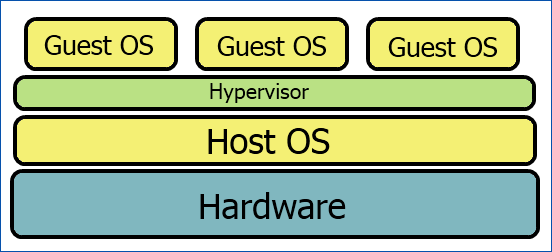If you want to get server space of some kind you don't necessarily need to rent an entire physical server, there are plenty of other options available. One of the more interesting is using a virtual private server, or VPS. Let's take a look at how these work and what they can do for you.
What Is a Virtual Private Server?
A VPS is a small, simulated server that runs virtually on an existing one. Like any virtual machine, it's separate from its host and operates as an independent entity, yet can't exist away from its host, either.
The tech behind VPS is similar to other virtual machines: the host machine runs a program called a hypervisor or VMM (virtual machine manager) which manages all the smaller virtual machines under it, called guests. In a diagram, it ends up looking like this:
If you think of a computer as a pie, then a virtual machine is a single slice of it. Virtual machines are a very cost-effective way to subdivide the processing power of larger machines and are used in all manner of applications, big or small.
Why Use a VPS?
To understand why VPS exists, we probably should take a small step back and look at servers, first. A server is a computer that provides files or data to other computers over a network. Servers can be directly accessible---via mouse or keyboard---or can be what's called a headless server, which can only be accessed remotely.
The entire internet is, at its heart, nothing more than a massive collection of interconnected servers. To do anything online, like start a site like How-To Geek or run a service such as a weather app, you need to run a program or host files on a server. No server, no site.
Thing is, though, that servers are large, powerful machines that are expensive to buy and maintain. As a result, most servers are either owned by large corporations for their own use---Google and Facebook, for example, mostly run their own servers---or are rented out to smaller companies by web hosting providers. These are businesses that own and operate servers for that very purpose.
However, if every person who wanted to start a site had to buy or rent an entire server, they'd be bankrupt before they ever got off the ground and the internet would be a far less diverse place. This is where virtualization comes in: rather than having to buy or rent an entire server for each site or online service, individuals and small companies can rent just a fraction of a server from a web hosting company.
The great thing about a VPS is that---to elaborate on our earlier analogy---you don't just get a slice of the computing pie, you get to decide how big the slice gets to be. As a result, they're a very flexible solution for companies that want to grow online and want their hosting to grow with them.
On top of that, VPSes are also interesting because they give users a lot of control over how they want to use the resources they have---like if they had their own server---yet still only pay a fraction of what a full machine would cost.
VPS vs. Shared Hosting
At first glance, VPS may seem an awful lot like shared hosting, where several sites share the resources of one server. The key difference between the two is virtualization: since they're virtual machines, each VPS is a computer all its own and it doesn't share resources like computing power or memory.
Shared hosting does share these resources, though, so it's pretty much just one server with many different people running their own site off it at the same time. As a result, when a website on the same server but running on another VPS experiences issues, they won't affect you. When using shared hosting, though, they will.
The upside to shared hosting, though, is that it's cheaper and a lot less trouble to set up, making it ideal for people just starting out or those with less technical know-how. In contrast, a VPS is an entire closed system that needs to be set up from scratch. As such, you need to know a little about what you'll be needing and how it will be used.
For example, when you're setting up a VPS you need to set up the operating system it will run under, if and how the CPU needs to be optimized, as well as adding memory, storage, and a host of other details. Each of these will have an impact on how your VPS will perform, so you need to have some idea of how your site will perform before setting it up.
That said, if you have the required skills and knowledge, then using a VPS is a great alternative to other types of hosting, shared hosting in particular. The ability to control how your hardware performs can pay off in many ways, so if you don't mind getting your hands dirty, VPS may be the way to go.


